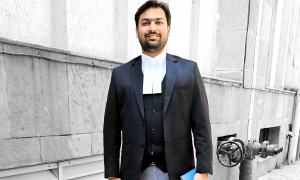This Interview has been published by Pragya Chandni and The SuperLawyer Team

Can you share with us your journey from law school to becoming a seasoned counsel, highlighting some pivotal moments or experiences that shaped your career path?
My journey from law school to becoming a seasoned counsel has been quite an adventure! There were many pivotal moments and experiences that have helped shape my career path. Starting as a trainee in a top law firm, I learned the ropes from my seniors in the corporate team. I remember feeling a bit intimidated at first, but they were so supportive and patient with me, which really helped me grow and develop. Moving to the Intellectual Property team allowed me to handle huge IP portfolios and gain experience with national and international filings and directly managing the clients. It was quite a challenge, but I loved it! Transitioning to in-house counsel roles at large FMCG and pharmaceutical companies provided me with the opportunity to delve into the business side of legal practice, which was really fascinating. These experiences have been instrumental in shaping my approach to legal practice and have helped me develop a unique perspective that combines legal expertise with a deep understanding of business dynamics.
You’ve had a diverse range of experiences, both in law firms and in-house roles. How have these different environments contributed to your skill set and approach to legal practice?
Yes, while starting my own firm was always on the radar, I wanted to be well-prepared and well-equipped for that and I felt it is important to have sufficient experience in Firms and in-house roles for holistic professional growth. Working in both law firms and in-house roles has really helped me develop a well-rounded skill set and approach to legal practice. In law firms, I honed my legal knowledge and expertise in understanding the intricacies, and the art of handling clients, while in-house roles allowed me to gain a broader perspective on the intersection between law and business. It’s been really interesting to see how the two sides of the legal profession work together to achieve common goals. This combined experience has been my USP that sets me and my firm apart. The blend of these experiences has helped me develop a strategic and practical approach to legal practice, where I am able to not only provide sound legal advice but also offer valuable insights on how legal considerations can impact business outcomes.
As a strategic partner for organizations, you’ve been involved in business development and advising on key initiatives while ensuring risk mitigation and compliance. Could you elaborate on how you balance these sometimes conflicting priorities?
Balancing business development, risk mitigation, and compliance can be quite challenging at times. As a strategic partner for organizations, my approach is to prioritize risk mitigation and compliance while also supporting key initiatives that drive business growth. This often involves conducting thorough risk assessments, collaborating closely with stakeholders, understanding the practical challenges and pain points, and proactively identifying potential legal issues. By maintaining open communication channels and fostering a culture of compliance within the organization, I have been able to strike a balance between these sometimes conflicting priorities. As a thumb rule, I ensure that Compliance and adherence to Law in its Letter and Spirit is pivotal for the sustainable and scalable growth of any Organisation and as the Legal Counsel, it is one’s responsibility to guide the management of the Companies in the right direction.
Throughout your career, you’ve been involved in negotiating, vetting, and drafting high-stake contracts. Can you share any strategies or approaches you’ve found particularly effective in these processes?
Negotiating, vetting, and drafting key contracts is something I Love and am always excited about! But over the years, I’ve developed some effective strategies and approaches that have helped me in these processes. One of the most important things is to thoroughly understand the needs and objectives of both parties involved in the contract. This allows me to tailor the contract terms accordingly and ensure that everyone’s needs are met while complying with all statutory requirements. Additionally, maintaining clear communication throughout the negotiation process, paying attention to detail, and seeking input from relevant stakeholders can help ensure that the final contract accurately reflects the agreements reached by both parties. Another crucial aspect is to interact with the respective department which deals with that particular project, to understand the background, the practical challenges, and the probable risks while drafting, reviewing, or negotiating a water-tight and robust contract. Lastly, following red-lining etiquette and ensuring that you have proper and valid reasoning and rationale for every change made, accepted or rejected is the most effective strategy and art of vetting and negotiating a contract.
Given your experience in supporting business development projects and signing commercial contracts with partners across various regions, what are some challenges you’ve faced in navigating international legal landscapes, and how have you overcome them?
Navigating international legal landscapes can present unique challenges due to differences in laws, regulations, language barriers, and business practices across regions. To overcome these challenges, it is crucial to conduct comprehensive research, seek local legal expertise when needed, and establish strong working relationships with local partners. By staying informed about international legal developments and adapting to the cultural nuances of different regions, I have been able to effectively navigate complex legal landscapes and support business development projects across various regions including APAC, AFMET, CIS, LATAM, US, UK and Japan. Yet another major challenge in cross border deals and the most negotiated clauses would be the jurisdiction, dispute resolution and applicable law clauses. The Company and counsels, before deciding on the jurisdiction and applicable laws, have to factor in various aspect such as the costs involved in dispute resolution in a jurisdiction, the practicality of adherence to foreign laws, the risks involved and how stringent/lenient the laws of such country are with respect to the subject matter.
There have been interesting instances where some foreign counsels deleted or modified clauses saying it is not in line with their laws, and when we delved deep and tried to understand their laws, it was not the case. Hence while working on cross-border deals, it is important to not just go by the other Party’s interpretation of laws, but personally verify it from our end, either in-house or by seeking local expertise in those countries.
Your role has also involved working with cross-functional teams across multiple departments. How do you ensure effective communication and collaboration in such diverse settings?
Absolutely! The key to successful outcomes in diverse settings is to prioritize open and transparent communication. I actively seek input from all departments involved in a transaction and encourage a collaborative work environment. By fostering a culture of mutual respect and shared goals, I have been able to facilitate effective teamwork and drive successful outcomes across multiple departments. Additionally, I make sure to take approvals, denials, or comments from cross-functional teams in writing and ensure that all stakeholders/relevant departments are marked in such communications to allow other stakeholders to raise any concerns or discussions if any. If it is an oral discussion, I send out the Minutes of the Meeting. This helps ensure that all discussions are recorded and can be referred to later if needed.
Mentorship and team development seem to be important aspects of your leadership style. Could you share some insights into how you nurture talent within your team and promote their professional growth?
Yes, I truly believe in nurturing talent within my team by providing opportunities for professional growth and development. I set clear expectations, offer constructive feedback, and empower team members to take on new challenges. Allowing and encouraging the team members to take ownership of every single task they handle, not just gives them confidence, but also makes them accountable for their assignments. Instead of giving them the answers, I tell them how to find the solution. This helps them handle any situation even in my absence and makes them better professionals. Having regular team meetings and brainstorming sessions has helped the team handle their workload meticulously and be abreast of the laws. I also believe in being open to feedback and constructive criticism, as it helps me and my team grow professionally. As Lawyers, it is important that we agree to disagree!
Looking back at your journey, what advice would you offer to fresh law graduates who are about to embark on their own careers in the legal field?
I would advise fresh law graduates to invest in continuous learning and professional development to stay abreast of legal developments and industry trends.
While it is easy to generate opinions or contract drafts using AI, it is important that every document is drafted meticulously and one understands the rationale behind every line that goes into a contract/document and mastering the art of interpretation. While AI is an effective tool that helps you work smart, it should not be a replacement for your hard work. Mere copy-pasting of language can land up being more dangerous and expensive than one can imagine.
Seek mentorship and guidance from experienced legal professionals to gain valuable insights and perspectives. No doubt is a silly doubt, never refrain from asking questions or getting clarification.
Build strong relationships with colleagues, clients, and industry peers to expand your network and opportunities for growth. Embrace challenges and opportunities for growth, as they provide valuable learning experiences that can shape your career path.
Above all, approach your legal career with passion, dedication, and a commitment to excellence in all that you do. All the very best!
























